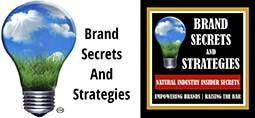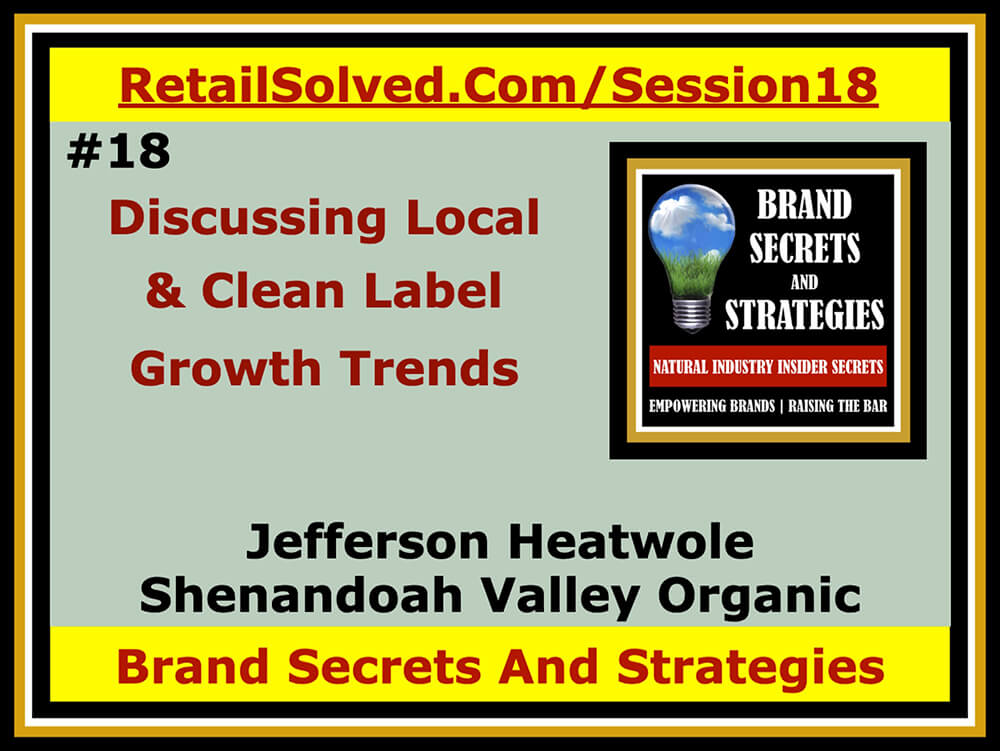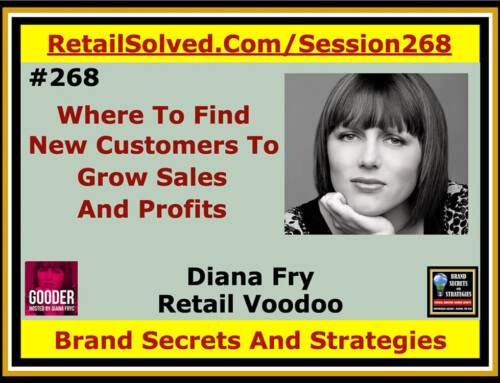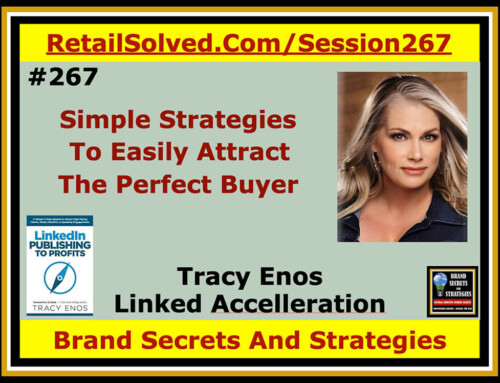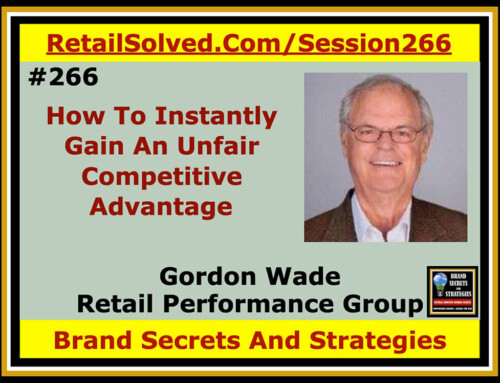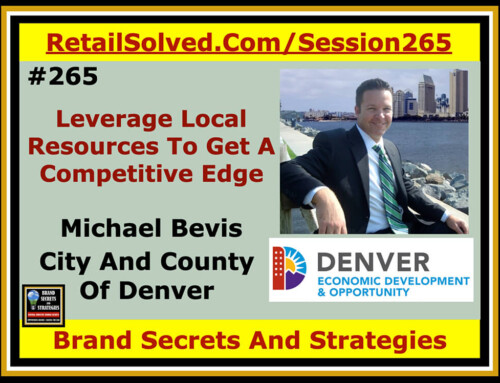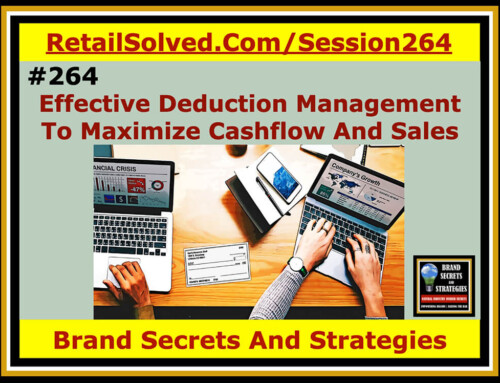Local, Clean Label and Transparency are the key natural organic growth drivers across every channel. Shoppers want and need to trust the brands they buy, they want to feel good about their purchase decisions. Learn growth strategies you can use to grow your brand with loyal shoppers.
Today’s episode is a perfect example of the type of thought leadership I want to share with you, to encourage you, and to help you be successful in every endeavor. I believe that small brands are the future of the CPG industry.
Today’s episode is about a company that took local to the next level. It focused on authenticity, giving back, and developing a product that was truly different and unique from anyone else out there. More importantly, this is a story about a company that focused on doing the right thing first. This is a story about a brand that went against the grain to develop a product that consumers really wanted and the results that they’re having supports that. The key point being that ethical business practices and supporting your local community while providing a product that consumers really want is the trend that’s growing natural today. It’s the trend that retailers need to take advantage of to drive shopper traffic into their stores, helping them compete more effectively.
I know you’re going to enjoy this episode, especially when you hear the passion that Jefferson has for his brand, for his local community, and for the products that he manufacturers.
Today I want to introduce you to Jefferson Heatwole. He’s the EVP of Sales of Shenandoah Valley Organic and he reached out to me a couple weeks ago. He’s got an innovative strategy for providing healthy products, healthy food, to consumers that I thought everyone listening to this podcast would really enjoy.
Download the show notes below
Click here to learn more about Shenandoah Valley Organic
BRAND SECRETS AND STRATEGIES PODCAST #18 Hello and thank you for joining us today. This is the Brand Secrets and Strategies Podcast #18 Welcome to the Brand Secrets and Strategies podcast where the focus is on empowering brands and raising the bar. I’m your host Dan Lohman. This weekly show is dedicated to getting your brand on the shelf and keeping it there. Get ready to learn actionable insights and strategic solutions to grow your brand and save you valuable time and money. LETS ROLL UP OUR SLEEVES AND GET STARTED! Dan: I'm always looking for innovative brands to come on the podcast and share their insights with you. If you have any recommendations, please reach out to me and let me know. Today's episode is a perfect example of the type of thought leadership I want to share with you, to encourage you, and to help you be successful in every endeavor. I believe that small brands are the future of the CPG industry. Today's episode is about a company that took local to the next level. It focused on authenticity, giving back, and developing a product that was truly different and unique from anyone else out there. More importantly, this is a story about a company that focused on doing the right thing first. This is a story about a brand that went against the grain to develop a product that consumers really wanted and the results that they're having supports that. The key point being that ethical business practices and supporting your local community while providing a product that consumers really want is the trend that's growing natural today. It's the trend that retailers need to take advantage of to drive shopper traffic into their stores, helping them compete more effectively. I know you're going to enjoy this episode, especially when you hear the passion that Jefferson has for his brand, for his local community, and for the products that he manufacturers. Welcome, today I want to introduce you to Jefferson Heatwole. He's the EVP of Sales of Shenandoah Valley Organic and he reached out to me a couple weeks ago. He's got an innovative strategy for providing healthy products, healthy food, to consumers that I thought everyone listening to this podcast would really enjoy. So Jefferson, can you please start by telling us a little bit about yourself, your company, and then how you got started in this industry? Jefferson: Sure, happy to and thanks Dan for having me on. SVO officially, Shenandoah Valley Organics, started business out of their plant in Harrisonburg, Virginia in March of 2014. We were small. It was 40 employees roughly and we'll talk a little bit about the growth and what's happening to focus on who we are, what we're doing, and why we got started. We grew up, our family and company, in the Shenandoah Valley. We're a group of farmers. Really my cousin, Corwin, who's the CEO of our company was raising chickens and he was talking to me and multiple other folks that were in the valley. Just to paint the picture, there's over 1,000 chicken houses within an hour of our office and our plant. Obviously, very agricultural centered and so that means that the conventional chicken companies have a huge presence here. Even though there's a lot of farmers and a lot of chickens, there's not a lot of variety in the contract model. So that was really the frustration with that model and how tough that was for the farmers, in addition to the raising standards, was why we ran a business feasibility study to begin with. Corwin had already begun raising organic chickens. Where, as a family, we're believers in not using spray, if possible, and always trying to be healthy and go about things with a natural process, as much as possible. I'm not going to pick on the wording, it's all natural, but actually practicing what we preach and raising to organic standards was something that we saw the benefit in. Not just from a health standpoint, but the standards were better from an animal welfare standpoint. All the chickens that we raised is farmer owned, which is a specific contract model differentiation between the conglomerate growers and is also all certified organic. We third party test for non-GMO project verification for all of our feed lots. We also comply with certified humane and global animal partnership step three on all of our chickens. We really felt that, from the beginning, it was good to have accountability partners in there. There's not many chicken startup companies. I believe the NCC told us we were the first scalable one that actually started up, not just been a branch of another large company in, I believe it was, the last 20 years. Certainly, when we got into this, we did not know all the growing pains that would go along with it, but it's been a joy to see the feedback really takeoff and the expansion of new jobs within the valley and also giving the farmers an option to change the raising standards. Raise healthier and more delicious chickens and also support the local community while we've been doing that. Dan: I love that. In fact, when we spoke a week, or so, ago you were talking about how you were able to involve a lot of the farmers within your area. Can you talk a little bit about that? Jefferson: Certainly. When we first started, we were doing about 15,000 chickens a week and now it's grow to around 140,000 chickens per week. At 15,000 chickens a week, obviously, you're bringing in chickens, but it's not making a big impact. While we're in now, we're working with 40-some farmers that are all within 15 miles of Harrisonburg, Virginia. The pay-scale is huge differentiator. They are compensated substantially more than a conventional grow out contract would compensate them. Also, again, the biggest part of that is that they're literally business partners in our business model. The farmers legally own their own chickens as opposed to us, the company, being completely vertically integrated. The feed and the chicks are purchased by the farmer and he contractually owns those birds until their time to be harvested. When we pick them up, we pay them back on a premium per pound basis. Again, we're a family company that it made sense from a whole lot of angles and it helped us in scalability, but it also helped us in a partnership with the farmers. Where they knew that they were part of the decision making process, and that's a direct impact on the care and the health that the chickens receive, as well. But you can imagine what a difference the farmer is going to give to each flock, if he's personally invested in each of these flocks and he owns the birds. We found that the feed conversion because of the quality is better. The health is better and also the stress level of the birds is better, so it just creates a great product. Dan: Fantastic. The idea of being able to leverage the farmers that support you, as partners, I think is a great idea. And it's a great model because, I believe, it's fair to say that no one person can be an expert in everything and if you've got a lot of other individuals that are committed, that are part of the process to help you grow, that makes so much sense in the world. You mentioned the farmer contract model. I'm getting the impression, and correct me if I'm wrong, that someone else owns the birds. Someone else owns, basically, the entire sales funnel, et cetera and you just work for whatever pennies, or whatever they throw you. I don't mean to downplay it, but is that a fair assessment? Jefferson: Well, I'm not exactly sure what the way you're phrasing it, but Dan I'll be happy to explain a little bit more about how we operate as a company. Dan: Please do. Jefferson: We own our own plant. We have a processing facility. We have 450 employees. We own all the ... What do I want to say? Intellectual property, but the company made the branding, and who we are, and what we do is, of course, centered around the supply of chickens. Our group of farmers is a key part of that supply funnel. We still are competing with large conglomerate companies that own every part of that process. Where SVO is different is we have a group of farmers that raises for SVO using our standards. And we are able to then negotiate feed and chick costing based on the quality of the farmers and chickens that we have. From that, we bring the chickens in every week, process them according to orders, and then ship them out all over the nation. I guess, if you want to say that we don't have a company, I'm not exactly sure what you're getting to there, but we certainly have a plant and we have a full process and a retail package of multiple lines of retail packed chicken. We're not only working with, for the processors to do chicken nuggets and patties and other items. We're also doing full fresh, raw and frozen, raw chickens for retail pack. Dan: Interesting. Where is your product sold? Jefferson: It's mostly up the Northeast corridor. We do have regular routes now into the northern Midwest and down into the Southeast. We have been making some shipments into California recently. 33% of our current level is retail and a small percentage of food service and then the rest is industrial that goes to further processors that are creating all sorts of different cooked chicken items. Dan: Interesting. As far as the quality is concerned, we started just in full disclaimer, full disclosure, we tried to do this a little bit earlier, but the sound quality wasn't really good. So going back to our conversation before we started again, you talked about the quality of the product and how you had a lot of chefs that are real excited about how your products taste so much better. The discerning pallet, I believe, is the term that you used. Jefferson: Right. That is something that really drives the demand. Again, we've only been doing retail packed chicken for just under two years now. As we got started, we needed to be able to not only tell a good story, but to deliver an excellent product. The diet of the chicken is a big part of it, but also the standards of being that we're compliant with certified humane and the gap standards, as well as, certified organic. It means that the chicken's not only eating a better diet, the feed that it's getting, but also it has a higher quality of life, which means it has lower stress. Dan: Then, of course, lower stress for anyone who's not listening, there are a lot studies, if you will, I don't know if it's scientific necessarily that indicate that an animal that grows up in a healthier more humane environment produces a better quality of food, more nutrients, et cetera. Following along that story, what type of results have you seen both in the retail and the food service part of your business, in terms of raising that part of your standards, in terms of your deliverable? Jefferson: Are you talking about in terms of the texture of the bite, or the taste of the product, specifically? Dan: Yes, all of the above. I mean, let me put it this way. What have you been hearing people say about what's unique, or different, or better about your product? Where I'm going with this Jefferson is, trying to differentiate between, if you will, the old style of doing it versus what you're doing. Jefferson: Sure. Absolutely. Of course, we've done shear tests, which have the texture, the toughness of the meat. If you raise a chicken that's had a lower stress life, the meat is consistently less tough than when you have a chicken that's raised under poor standards. Another thing I'll add to that though too is just the age and the size of the birds. The bird lives a quality life and is, for us, our target live weight is six and a quarter pounds. We've seen plenty of conventional chickens that have been raised to eight, nine pounds that it's just going to be tougher naturally too, because not only is it living a tougher life, I'll say, but it's also being raised to a size that may get a lot of breast meat, but the meat quality is extremely tough. A lot of people do find that to be offsetting. Dan: I've got to admit that, that's one of the big things I look for in the foods that I produce, excuse me, the foods that I consume is something that is, not only tasty, but something that is not, I guess, chewy. It goes back to some of the stuff I've tried with just ... I won't say it's shoe leather, but it's really bland. It really doesn't have ... You know where I'm going with this, right? Jefferson: Yes I do. Dan: That's exactly what I was hoping you were going to get at. Any other thoughts you want to throw in there? Some comments, maybe, you've heard, that you've received from executive chefs, et cetera. Jefferson: Sure. We've been part of many, many cook-offs, if you will, and side-by-side comparison. We really believe that diet has a lot to do with it. It's both the diet and the quality of life that the animals are able to live. When you ... Again, I'm a fan of a lot of different animal proteins. I don't mind a pheasant or a quail or some other more exotic birds, if you will, but the lowly chicken is not supposed to be completely tasteless, bland, rubbery, chewy, nastiness. It's supposed to be something that you can ... If you're going to cook with it, you can take in a lot of directions. But even if you just use a little bit of oil to pan fry it or bake it, it's something that's still is good to eat with, maybe, a touch of salt. What we've really developed with our diet is a chicken that, not only texturally is appealing, but also the taste. You never want it to be too gamey, but you do want it to be flavorful, so it certainly still tastes like chicken. The comment that I'm most often hear is, "This is the way a chicken is supposed to taste." When we hear that we know we've done our job correctly. Dan: That's fantastic. You think about all the camping trips I've taken in the past year is where we'll eat something that we caught, not a chicken, and people would say, "What's it like?" Well, it's like eating chicken. It's getting away from that, some of the things that we ate weren't necessarily the best, bugs, et cetera, so I love that idea. In terms of the product itself, you're talking about diet. What does a chicken eat? Jefferson: Well, obviously, a free-range chicken is going to get out there an eat grubs and whatever they get into. They're like feathered little dinosaurs out there. They scratch and claw and eat about anything that's out there in the grass or under the trees. The diet that they're typically fed is going to be plant-based. It's going to be a vegetarian diet. Again, if it's certified organic, it all has to be stuff that comes out of the earth, so there's going to be corn, and soy, and wheat, and minerals. There's different variations of these things. Sometimes it will have something a little bit different in there, but, you know, without getting into too much proprietary stuff, I'll just say it's grains and minerals that come out of others. Dan: That makes a lot of sense. In another episode I was talking, we were talking about this, actually before. Where I interviewed Tim Joseph of Maple Hill Creamery and we talked about the fact that cows are not designed to eat hay, and grain, et cetera. So liken that to your story and, again, that's one of the main reasons I wanted to invite you on the podcast. To be able to feed the animal, a chicken, what it was designed to eat and metabolize, produces a better quality food, not the cereals and the byproducts that I've heard that a lot of companies feed their animals. What have you seen, in terms of does it make the food more tender? Does it help the chicken be healthier? Then, I guess, really where I'm going with this, a big part of this, is how does it help the overall health of the bird so that you don't, hopefully, need to use ... I mean, I know you don't, but hopefully you wouldn't need to even consider using any sort of antibiotic or whatever. Jefferson: Right. Well, if you can hear this sound, it's me knocking on wood. But we have not had to treat any of our flocks with antibiotics, to date. That's good progress that, I think, is a testament to the farming standards and the quality of care that the farmers are giving the flocks. I will note, a lot of people don't know this, but with the conventional chicken feed, it includes a lot of animal byproducts. That means processed animal guts and other stuff that quite often the chickens don't realize that the chicken that they're eating is kind of cannibal chicken, not by their choice, probably, the chicken's choice that is, but it's done because it's safe, food grade-wise, according to the government because they're heating up this byproduct. But the reason it's done is to give the animal a cheap protein. When you have a very high protein diet, that means that the chicken's going to gain meat mass faster, which means that you get pounds in and out of the chicken house and to the processing plant at a lower cost. While that does mean that the chicken is going to be a little bit less expensive, it does mean that, again, you think about how something ... If it grows in a natural progression over a certain amount of timeline, it can have a little less rapid growth. And the feed conversion if based off of their natural diet, and they're able to exercise. Another thing, again, it just might not be common knowledge in the market outside the chicken industry, is that natural lighting plays a big part of the animal's life. In a conventional chicken house they don't have natural lighting. In fact, they shy away from that as much as they can, so they can do a rapid cycle day. In other words, it might be completely pitch black outside, but they turn on the lights on these chickens to wake them up. Because when they wake up, they eat and after they give them a little bit of time for their eating, they shut the lights back off and that might even be during the day. So that you're promoting a high protein diet, so the chickens wake up eat and then fall back asleep, as much as possible, because if you feed me a lot of fat and a lot of protein and all I do is sleep and eat, I'm going to gain weight pretty quickly too. Dan: Yeah. That's interesting, I had no idea that they did that. I knew that their practices weren't clean and weren't, basically ... I don't want to say that they're not safe, but certainly not the kind of chicken I'd want to eat, but certainly, I guess, I wouldn't say humane. I appreciate you really going ... You're explaining this and sharing those insights because I don't think a lot of people, to your point, really understand that what they're eating, in terms of when they buy a chicken, and why it makes so much sense to buy an animal like the kind that you're raising. What success have you seen, in terms of your products at retail? Jefferson: That's been quite the journey for us and, overall, it's been a great story. Certainly, not without competition out there. We've done some work in some regional programs with even Costco and Whole Foods. Now, we have more stores that we're in. We're in a little over 500 stores now, but we already have contracts on, I think, that number will grow to about 2500 stores over the next 12 months. Online, like meal kid companies, have been a huge part of our growth. We really focused on getting in front of growing categories. So we've had very good success in some of these, what may have been, niche markets three years ago. Where we are now, and part of the reason I was so happy to speak with you, was the branding that we're doing now is farmer focused and getting that SVO farmer focus story out there. It's not just a product, it's a brand. It's a business model. It's the way we are operating and it's really the reason why SVO exists in the market. That's what's exciting. If you have a quality product, that's raised to high standards, that can be tied to delicious healthy eating and you have a strong story to support that branding, then you've got a product that can resonate well with those consumers. So we're very excited to see where things go from here. Dan: That's sounds exciting, in fact, let me back up a little bit and frame this for the audience. If you've been listening to my podcast, consuming any of my content, I routinely talk about the fact that consumers are not motivated by price, despite what "all the experts" say. Consumers want quality. They want value. When they talk about value, they want products that meet their nutritional needs, not just something to fill you up or hunger again in a little bit. When I look, as a category management expert, at what's driving sales in categories, what I see is it's these smaller niche, disruptive brands, that are providing incredible value, in terms of the quality of the food, the way the food's produced, and another cool thing that you're doing is you're speaking to the local. You're speaking to the consumer that wants to give back and support an ecosystem that is really valuable or important to our planet, to our healthy way of living. I love the fact that you've got into that. The branding piece, you were talking about that when we spoke earlier, about how you're able to provide some traceability back. Jefferson: Absolutely. It's certainly something that you could see on our website. Hopefully soon, in a store near you, you can see where to buy us at svorganic.com. There's a where to buy function, but there will be a lot of very exciting packaging updates and more story telling around the branding over the next few months. Farmer focus has something that we have not seen anywhere else in the chicken world and that's providing full transparency and traceability for every package, every product, all the way back to the farm. There's a farm ID on that package that you can login and enter the code and you will see where the farm is located and the farmer that's raising that chicken. And a little bit of information about them and pictures from the farm. That's something that we've seen other people that will claim traceability, but when you actually go in and you check it out it just shows this is a farm that it could have been from, or maybe it was from this area, it never specifically tagged to a farm. That's something that, especially understanding consumers, that live in this day and age, they want transparency. They want to know where their food came from. That's not that every single person is going to check the farm that their product came from, but we've heard overwhelmingly that people embrace the thought process and that we're willing to hold ourselves to that accountability level with the consumer and the farmers are part of that process. That transparency is something that can build trust. And the consumer just likes knowing that if they want to, they can go into it and look at the information there online, but also they ... There's quite a large number of folks, as well, that it just it's not logging in and checking out two pictures and knowing the farming family that raised that animal that represents the food that's on their family's plate. Dan: Love that, in fact, a lot of companies really struggle. Big CPG companies, really struggle with this whole concept of transparency and trust. The bottom line is, and you touched on this, thank you, is that a lot of the big brands out there say, "Hey, you can trust us," but then there's a recall or there are issues with the way their product's produced. Jefferson: That's right. Dan: Or they find antibodies, or GMO, or something in the product that shouldn't be there despite all their warnings, despite all their assurances. So the ability to be able to trace back to the farmer that produced the product is fantastic and that is the big trend in driving natural organic products across the entire ecosystem. Another thing that I really love about what you're doing is you're bringing that farmer, if you will, into my home to help me develop a relationship with that individual farmer to help give me an appreciation for what life would be like in their shoes. Jefferson: That's right. Dan: Which helps me better understand why giving back and why helping to support this sort of ... your organization, but also the farmers that work with you is so important. Because, I think, at the end of the day, consumers ... Not I think, but I know, at the end of the day, consumers want to feel good about the purchases that they make. They also want to feel good about supporting their local community, even if that local community is a couple states away. Jefferson: That's right. There's a reason that nationally ... What's the average farmer age? I think it's 57 now, is continually going up. Because, even if it's, for example, my great-great-great-great-great grandfather that came over from Germany, he farmed and every generation since then has farmed, up to my dad. It's what I grew up doing and Corwin does, as well. And it's really unfortunate that, especially over the last few decades, there hasn't been the motivation for the children of farmers that have been doing it for many generations can be excited enough to continue on this tradition. It's very important that we understand, as consumers, that when we vote with our dollars, it makes a direct impact on the farming community. That's a large part of the ... I don't want to say the curtain being pulled, but a lot of consumers don't necessarily want to think about the fact that an animal is raised and lives a life so that it can become a meal that's able to feed their family. When you don't think about that, and it's something that happens at a farm far away, at a factory, and whatever happened when it gets to me, I just want to buy cheap. That's something that, if that's the only driving factor, that is going to really shape the food supply chain. I love throwing out this stat. When we first started, 75% of the chicken houses that we were able to use for organic standards, again, because of relaxed density and not needing all the new fancy upgrades because we're using more natural raising standards. 75% of those houses were previously unused, meaning they had already served out their life, but some of these houses were built in the 1990s. So they maybe didn't have the newest LED lighting or cooling cells, what have you. And because the farmers didn't have hundreds of thousands of dollars to put back into those houses to maintain the contract that they had with the large grower. They're literally cutting coal views in the sides of their chicken houses and putting up vents outside and raising chickens again, many of these farmers were able to climb out of debt. Some of them were able to stop working second and third jobs that they had to work to support their family and instead focused on quality of family life and farming. What they loved doing. They're good farmers. They just were beat up by a very tough system. The strength in story for SVO is that the consumer can know, through this transparency that we're offering them, that when they choose to vote with their dollars to support a company like us, it directly impacts the farmers that are partnered with us. And they're compensated, just to throw out a number, at 65% better compensation than they get on a conventional contract model. So they're investing in it. They're taking risk with us, but it's a substantial payoff that still works for our side, from the feasibility and sustainability process because we're able to raise the chickens healthier. You have less DOAs. You can have a good healthy, high quality, product that we can sell out on the market and still be competitive while paying our farmers a fair wage that supports their lifestyle. Dan: How critically important. I live in Colorado and I've grown up in a lot of different communities where you have farming and ranging and so on and so forth. To your point, big businesses made it so difficult and scary and there's so many questions about how do you survive if you can't meet the scale of the big guys who are producing unbelievable amounts of product. For you to be able to come up with a strategy as part of your business model, to be able to support the little guy, to help them get back to the land, the community, et cetera, I think is tremendous. I applaud what you are doing. What other insights, thoughts, or ideas would you like to share with the audience? Jefferson: You know, I think we've really covered a lot of it. Thank you Dan for helping with that by asking very good questions. Dan: Any time. Jefferson: I just encourage awareness. That's something that I always say we now live in an age where we have computers in our pockets. Use that information. Find out more about your food chain and the health impact that, that makes. But also the identity behind the company that are putting product out there, like Mable Hill Creamery, a great company. Once you learn more about that process and the impact that it makes with the farmers that they're working with, it can get you more excited not just about the actual food product, but about the company and the families that you're supporting by choosing that product. I would say look us up. Find us on social media and reach out to us. We love the dialog. We're always happy to talk with people and answer questions that they may have. Check us out on the web and we certainly look forward to hearing from anybody who would like to find out more about us. Dan: I really appreciate that. In fact, that really goes to the heart of everything I do. People want to be a part of the community. They want to be a part of the food that they eat. They want to be able to be a part of a movement, if you will. If I can call you that? Where you're supporting more than just yourself. Jefferson: That's right. Dan: It's more than just putting dollars in the bank, or in your pocket, et cetera. It's really giving back. Again, I cannot thank you enough for that. To your point, about encouraging awareness. The content that I produce, the reason that I do this show, is to, again, it's for you, it's about you. But more importantly, it's about developing that awareness so that I can help natural retailers compete effectively by helping the brands that support them, like your brand, understand who that consumer is that buys the product. Why they buy the product and why, ultimately, they're far more valuable to them than the consumer that walks in and buys a single highly processed item and then leaves. Jefferson: That's right. Dan: Because, long story short, true loyalty is about supporting retailers that understand, and give back, and support the needs of the consumers who shop there. So thank you, again, for all your insights. Again, thrilled to meet you. Thank you for reaching out to me. I look forward to continued conversations. Jefferson: Yeah, likewise Dan, thanks so much and, again, I appreciate you accepting my outreach, as well. I've been a big fan of your podcast and what you're doing. So look forward to further chats, as well, and thanks again for your time. Dan: Thank you. Thank you for joining me today. I'll put a link to Shenandoah Valley Organic on my website and in the show notes. The show notes can be found at brandsecretsandstrategies.com/session18. Today's freebie is my guide Strategic Solutions to Grow Your Brand. You can text your “strategicsolutions” to 44222 or download it on my website. I look forward to seeing you in the next episode. This episode's FREE downloadable guide This short guide levels the playing field between small brands and their more sophisticated competitors. It highlights the advanced strategies the big brands use called Category Management - what retailers want. CLICK HERE TO DOWNLOAD YOUR FREE STRATEGIC GUIDE: Strategic Solutions To Grow Your Brand Thanks again for joining us today. Make sure to stop over at brandsecretsandstrategies.com for the show notes along with more great brand building articles and resources. Please subscribe to the podcast, leave a review, and recommend it to your friends and colleagues. Sign up today on my website so you don’t miss out on actionable insights and strategic solutions to grow your brand and save you valuable time and money. I appreciate all the positive feedback. Keep your suggestions coming. Until next time, this is Dan Lohman with Brand Secrets and Strategies where the focus is on empowering brands and raising the bar. Enter your name and email address below and I'll send you periodic updates about the podcast. Sign up to receive email updates
Listen where you get your podcast
Like what you’ve heard? Please leave a review on iTunes
FREE Trade Promotion ROI Calculator:
Click Here To Maximize Sales And Profits
Free brand-building resources to help you grow and scale
Turnkey Sales Story Strategies FREE ON-DEMAND COURSE
Why Most Brands Fail – The Roadmap To Sales Success FREE ON-DEMAND COURSE
Essential In-Store Customers First Marketing Strategies FREE ON-DEMAND COURSE
How To Drive Profits With Sustainable Packaging FREE ON-DEMAND COURSE
The Retail Game – What You Need To Know With Bob Burke FREE ON-DEMAND COURSE
Sales Success Begins With A Solid Business Plan FREE ON-DEMAND COURSE
How To Turn Your OnLine Data Into Explosive Sales Growth FREE ON-DEMAND COURSE
2016 Category Management Handbook Page 20 & 21
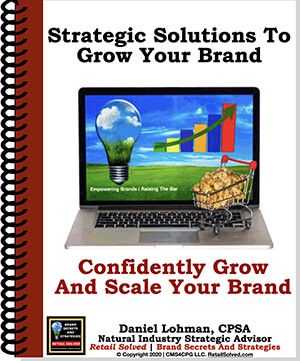
Need Strategic Solutions To Grow Your Brand?
This short guide levels the playing field between small brands and their more sophisticated competitors. It highlights the advanced strategies the big brands use called Category Management – what retailers REALLY want.
Empowering Brands | Raising The Bar
Ever wish you just had a roadmap? Well, now you do!
Don’t miss out on all of these FREE RESOURCES (strategic downloadable guides, podcast episodes, list of questions you need to be asking, and know the answers to, the weekly newsletter, articles, and tips of the week. You will also receive access to quick and easy online courses that teach you how to get your brand on the shelf, expand distribution, understand what retailers REALLY want, and address your most pressing challenges and questions.
All tools that you can use, AT NO CHARGE TO YOU, to save you valuable time and money and grow your sales today!
Image is the property of CMS4CPG LLC, distribution or reproduction is expressively prohibited.
